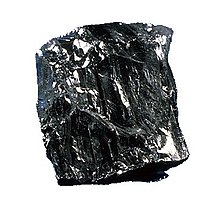coal
See also: Coal.
English

Etymology
From Middle English cole, from Old English col, from Proto-Germanic *kulą (compare West Frisian koal, Dutch kool, German Kohle, Danish kul), from *ǵwelH- (“to burn, shine”). Compare Old Irish gúal (“coal”), Lithuanian žvìlti (“to twinkle, glow”), , Persian زغال (zoġāl, “live coal”), Sanskrit ज्वलति (jvalati, “to burn, glow”), Tocharian B śoliye (“hearth”), all from the same root.
Pronunciation
- (UK) IPA(key): /kəʊl/, /kɔʊl/
- Rhymes: -əʊl
- (General American) IPA(key): /koʊl/
Audio (US) (file) - Homophones: cole, kohl
Noun
coal (countable and uncountable, plural coals)
- (uncountable) A black rock formed from prehistoric plant remains, composed largely of carbon and burned as a fuel.
- Put some coal on the fire.
- (countable) A piece of coal used for burning (this use is less common in American English)
- Put some coals on the fire.
- (countable) A type of coal, such as bituminous, anthracite, or lignite, and grades and varieties thereof.
- (countable) A glowing or charred piece of coal, wood, or other solid fuel.
- Just as the camp-fire died down to just coals, with no flames to burn the marshmallows, someone dumped a whole load of wood on, so I gave up and went to bed.
- Charcoal.
Hyponyms
Derived terms
Related terms
Translations
uncountable: carbon rock
|
countable: carbon rock
|
smouldering material
|
- The translations below need to be checked and inserted above into the appropriate translation tables. See instructions at Wiktionary:Entry layout § Translations.
Translations to be checked
|
Verb
coal (third-person singular simple present coals, present participle coaling, simple past and past participle coaled)
- (intransitive) To take on a supply of coal (usually of steam ships).
- 1890, Oscar Wilde, chapter XVI, in The Picture of Dorian Gray:
- The light shook and splintered in the puddles. A red glare came from an outward-bound steamer that was coaling.
- 1863, Colonial Secretary to Commander Baldwin, USN
- shortly after that she coaled again at Simon's Bay; and that after remaining in the neighbourhood of our ports for a time, she proceeded to Mauritius, where she coaled again, and then returned to this colony.
- (transitive) To supply with coal.
- to coal a steamer
- January 1917, National Geographic Magazine, Volume 31 Number 1, One Hundred British Seaports
- Cruisers may be coaled at sea and provided with ammunition openly. The submarine may not
- (intransitive) To be converted to charcoal.
- 2014, Ken Mudge and Steve Gabriel, Farming the Woods
- After the initial burn the goal of any good fire should be coaling; that is, creating a bed of solid coals that will sustain the fire.
- 1957, H.R. Schubert, History of the British Iron and Steel Industry, page 18:
- As a result, particles of wood and twigs insufficiently coaled are frequently found at the bottom of such pits.
- 2014, Ken Mudge and Steve Gabriel, Farming the Woods
- (transitive) To burn to charcoal; to char.
- '1622, Francis Bacon, Natural History
- Char-coal of roots, coaled into great pieces.
- '1622, Francis Bacon, Natural History
- (transitive) To mark or delineate with charcoal.
- 1551, William Camden, Remains concerning Britain:
- […] marvailing, he coaled out these rithms upon the wall near to the picture
References
“coal”, in Webster’s Revised Unabridged Dictionary, Springfield, Mass.: G. & C. Merriam, 1913, →OCLC.
Anagrams
Categories:
- English terms inherited from Middle English
- English terms derived from Middle English
- English terms inherited from Old English
- English terms derived from Old English
- English terms inherited from Proto-Germanic
- English terms derived from Proto-Germanic
- English 1-syllable words
- English terms with IPA pronunciation
- Rhymes:English/əʊl
- English terms with audio links
- English terms with homophones
- English lemmas
- English nouns
- English uncountable nouns
- English countable nouns
- English verbs
- English intransitive verbs
- English terms with quotations
- English transitive verbs
- English 2-syllable words
- en:Mining
- en:Natural resources
- en:Rocks
